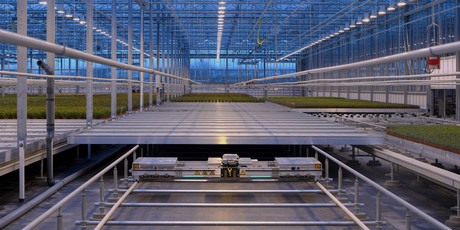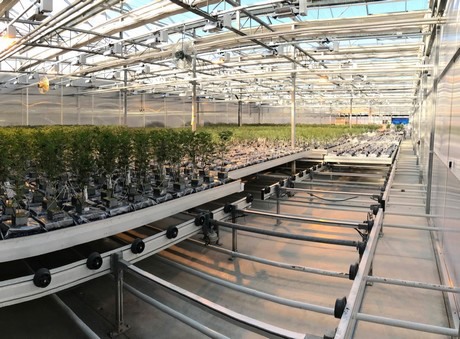Huge greenhouses, highly technologically advanced indoor facilities, thousands and thousands of plants. The level of complexity that a large-scale commercial cannabis facility requires is unprecedented in controlled environment agriculture. There are so many elements that need to be addressed and fine-tuned, plus cannabis is such a high value crop, that it is very risky to overlook certain aspects. One of the key elements, indeed, is the logistical system within the growing facility. “If you compare a greenhouse to the human body, the logistical system is basically the blood system,” Dennis van Dijk with Logiqs explains. “We design systems with aluminum tables where we put plants on, and transport them from a centralized working area to the designated climate zones.”
A grow facility 'blood system'
The importance of such a system goes without saying, as it is one of the main factors that contributes to a more efficient workflow. “When designing such a facility, the logistical flows are among the most important things of the design,” Dennis remarks. “This is why it is crucial that such a thing is thought out during the design process, also because our solutions have a certain degree of flexibility that is necessary to adapt that to the needs of every grower.”

“We try to understand what is the need of the grower, which processes they are going to use, and how much time they have in a day. Then, we try to visualize the grow schedule: that’s basically all we need to know in order to design the logistical system for a facility.”
Standardization and flexibility
Even though a fixed grow schedule and dito flow is a very hot topic in the cannabis industry, there are some situations in which flexibility becomes of the utmost importance. “Thing is, a grower could decide to grow a product that takes, say, 14 weeks for instance; but then, in the future, the same product might take a shorter time – that’s a common thing among growers,” Dennis says. “In this way, growers can adapt to future changes without investing in new equipment.”
The implementation of such a logistical system is a key element because it also affects specific processes. “For instance, we have noticed that some growers wanted to use drip irrigation,” he observes. “There are examples in which that is a must, but it is not always the case. Drip irrigation and moving benches don’t really go hand in hand. When you expand into a larger facility, and you want to automate transport, the best thing to do would be to take a good look at the actual needs of the plants regarding irrigation. ”
Pushing forward
That is why being flexible and promoting customization is necessary. At the same time, the only way to push the industry forward is to have standards upon which innovations can be built. “We are going towards a future where we will have to use some standardization,” he points out. “If we want to grow as an industry, we need a certain standardization to be able to innovate at a much faster pace. Working with customization is very good, as it allows you to build and design exactly what you want. But if you look at the longer term, standardization is a prerequisite for developments and gives the grower a much higher performance.”

“As a company, we combine standardization of our machinery, and at the same time we have a significant part that keeps innovating said standards and finding out new possibilities and machines. There is still a lot of pioneering to do in this industry. Many things still need to be fully sorted out and understood: if you see the positive effects that people from other industries had when some of them joined cannabis, it is clear that there is still room for improvement, regardless of the undisputed level of professionalism of cannabis people.”

